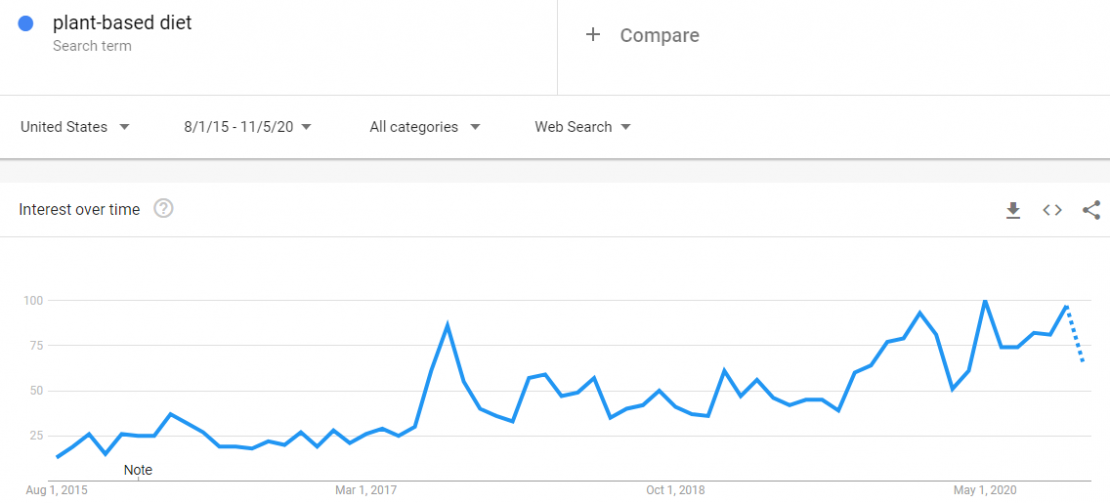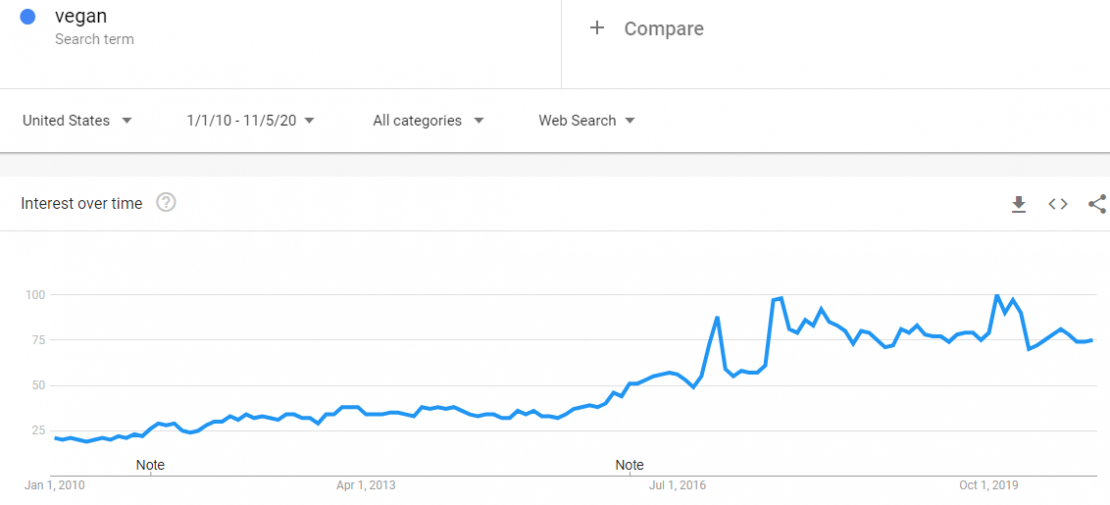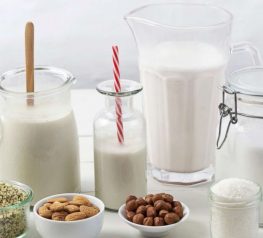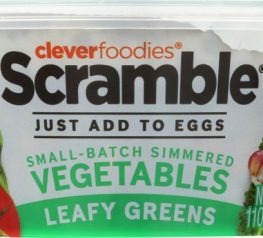Guide to Plant-Based Food Trends for Resellers in 2021
Sometimes it can seem like every month there’s a new “food trend”. You’ll see fads come and go, making it hard to separate the wheat from the chaff, so to speak. Many of these food trends make promises that just can’t be kept – they’re designated as “superfoods” or marketed as cure-alls for anything and everything. It can get overwhelming!
However, vegan and vegetarian products, otherwise known as “plant-based” foods, have enjoyed steady growth. The popularity of these food items has grown over the years, creating more and more demand, including in online stores. That being said, let’s take a look at this guide for plant-based food trends for online resellers.
What Is Plant-Based Food?

Before we examine food trends, it’s important that we define what we’re talking about first. So what exactly does “plant-based” mean?
Essentially, it means that most or all of a person’s diet comes from plant sources, including vegetables, grains, nuts, seeds, legumes, and fruits. In most cases, a plant-based diet doesn’t usually include animal products, though some people bend the rules a little bit.
For instance, let’s take a look at the basic types of plant-based diets:
- Vegan. 100% plant-based, this diet includes absolutely no animal products. In fact, some vegans won’t even use leather clothes or beauty products that include beeswax.
- Vegetarian. Almost entirely plant-based, this diet may include eggs or dairy (but no meat). Ovo-lacto vegetarianism includes both eggs and dairy, ovo vegetarianism includes eggs but no dairy, and lacto vegetarianism includes dairy but no eggs.
- Semi-vegetarian. Mostly plant-based, this diet may occasionally include meat and/or poultry. Pescatarianism includes fish and seafood.
Some people go plant-based for moral reasons – they believe that eating meat or poultry is cruel. Others choose a plant-based diet for environmental reasons – meat and poultry production is generally not sustainable, especially in large-scale factory farms.
At the end of the day, there are multiple plant-based diets. For many people, this is a highly personal decision that depends on their individual beliefs and concerns.
Consumer Interest In Plant-Based Foods Is Growing

As an online retailer, you have to keep your eyes peeled for what customers want. Luckily, there are some tools and strategies you can use to find popular food trends.
Plant-based diets have shown remarkably consistent growth over a long period of time. We can see this in action using certain tools, including Google Trends. This tracks search interest for a given keyword or key phrase over a given period of time. For instance, let’s take a look at the Google Trends data for plant-based diet over the past five years:

As you can see, there’s been a significant increase in search interest for plant-based diet on Google, especially in the past two years. This corresponds to the increase in consumer interest, including higher demand for plant-based foods and beverages. If you have an e-commerce store, you can meet this demand by selling these goods in your online store.
Additionally, let’s also take a look at the search data for vegan for the past 10 years:

The Google Trends data for vegan is even more pronounced. Up until mid-2016, it stayed fairly consistent. However, in the summer of that year it began to climb drastically and reached a level three times higher than the previous trending data. This marked increase corresponds roughly to the same time that the search interest in the search term plant-based diet also increased.
There’s another tool we can also use: SEMRush. This tracks the number of monthly Google searches for a given keyword or key phrase, including the following relevant search terms:
- Vegan – Over 15 million monthly Google searches.
- Vegetarian – Over 4.2 million monthly Google searches.
- Plant-based – Over 1.3 million monthly Google searches.
- Plant-based diet – Over 165 thousand monthly Google searches.
According to a 2020 report from the Good Food Institute, the plant-based food market will reach $74.2 billion by 2027 with a projected growth of 11.9% from 2020 to 2027. Additionally, dollar sales of plant-based products grew 11% in 2019 and 29% in 2018 to 2019. On the other hand, total food dollar sales in the US grew only 2% in 2019 and 4% in 2018 to 2019.
Finally, there are also two regular trend lists published by major players in the food industry:
Each of these resources feature tons of vegan and/or vegetarian products year after year, reflecting the wider market trend towards plant-based products.
Why Do Consumers Choose A Plant-Based Diet?

- A plant-based diet has multiple health benefits, especially when compared to a conventional meat-based diet.
- Plants are extremely high in fiber, which can help with gut health and digestion.
- It’s more environmentally friendly – factory farming for meat, poultry, eggs, and dairy are notoriously unsustainable.
- A plant-based diet is cruelty-free, meaning that it’s more compassionate towards animals.
- Vegans and vegetarians frequently report feeling lighter and more energetic.
- Plant-based recipes and diets have become more varied and delicious in recent years.
- There are more vegan and vegetarian options available today.
- More and more celebrities and athletes are going plant-based, for both health and moral reasons.
What Drives Consumers To Choose Certain Foods?

So why do some people choose a plant-based diet? What causes consumers to choose certain foods? In food and beverage marketing and industry analysis, there are consumer drivers which determine what types of foods consumers choose. It’s important to understand these when talking about plant-based food trends. The three primary consumer drivers are:
- Health and Wellness – This is a major consumer driver. People will buy food that they think is better for them – this can include higher nutritional value, less fat, fewer calories, lower sugar, more natural ingredients, and even the perception that the food may prevent certain diseases. More and more consumers are becoming health-conscious, especially in the US.
- Purposeful Eating – This is food that aligns with a person’s belief system, including sociopolitical and/or religious values.
- Flavor Tourism – This has to do with the authenticity of a certain type of food. As consumers become more aware and curious of other cultures, they want to experience and sample the foods from these cultures.
Health and Wellness and Purposeful Eating are especially relevant to plant-based food trends. There is a strong link between vegetarian/vegan diets and improved health for both the person and the environment. Additionally, many consumers believe that animals shouldn’t be used for food, so plant-based diets meet that consumer driver as well. Finally, Flavor Tourism might also play a role – essentially, cultures have plant-based diets, so vegan/vegetarian products may meet consumers’ wants for authentic food experiences.
How To Market Plant-Based Foods In Your Online Store

Consumers always want to know what they’re getting, so clearly state that the product is vegan or vegetarian. Plus, “plant-based” is a buzzworthy word, so you should use it in your marketing and product descriptions.
You should avoid saying “meat-free” or “dairy-free” – this is focusing on what the consumers are losing. Instead, it’s important to emphasize what the consumer is gaining, so say “plant-based meat” or “plant-based cheese” instead. Vegan and vegetarian were once considered to be lacking when compared to conventional meat-based diets, but that’s since changed with the explosion of options and flavors in the plant-based market.
Focusing on the positives is extremely important, so always focus on flavor! Be sure to use lots of evocative words that trigger emotional responses in the online shopper – think of descriptions you read on the menus of fancy restaurants. This can include words like appetizing, aromatic, authentic, candied, caramelized, creamy, crisp, crunchy, delight, fiery, fresh, fruity, gourmet, grilled, infused, intense, juicy, lavish, lean, mellow, mild, mouth-watering, peppery, refreshing, ripe, roasted, savory, seasoned, smoky, tangy, and/or tender.
You want to appeal to the shoppers’ senses and emotions with positive associations. This may be counter-intuitive, but don’t emphasize how healthy it is. Most people equate “healthy” with bland or unsatisfying. People know that plant-based is healthier, so instead focus on the look and feel of the food.
You should also highlight the food’s “origin story” – consumers want to know about where the food comes from. Make sure to focus on storytelling elements, especially if there’s something special or wholesome about the brand.
Finally, make sure you describe how the food is more sustainable or cruelty-free to target consumers who are driven by Purposeful Eating,. This is especially relevant with plant-based products.
Start Dropshipping Plant-Based Foods With GreenDropShip
Being an independent entrepreneur has lots of benefits, including being able to work from home. With that in mind, you could use dropshipping to sell plant-based products online. This is an e-commerce retail model in which the online retailer does not handle the inventory. Instead, the dropshipping supplier is responsible for inventory storage, packing, handling, and shipping. As you might imagine, this is an ultra convenient, low-cost, and low-risk business model. Additionally, you can dropship on Amazon, Shopify, or WooCommerce.
As a premium and gourmet dropshipping supplier, GreenDropShip has an extensive selection of plant-based food and beverage products for your online store. We have over 20,000 natural and organic products for our members to choose from. Our selection includes all the latest plant-based food trends that we know your customers will love. These include plant-based milk and vegan protein powder, both of which are in high demand.
Setting up a food and beverage dropshipping store that carries these products is incredibly easy. Just contact our support team and they can get you started.
Join GreenDropShip Today and start making sales!









